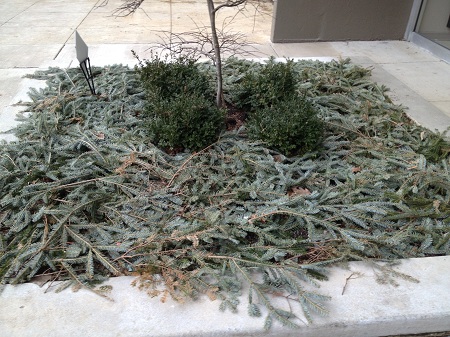
Snow & Ice Control
Concrete Damage From Rock Salt
It is common knowledge that rock salt will damage concrete sidewalks and driveways. However, what is not well known is that ALL ice-melters can damage conrete. This article will explain how and why it happens, and what can be done to help prevent this damage.
The Freeze/Thaw Cycle
Everyone knows that water freezes at 32 degrees and forms ice or snow. How ice melters work is to lower the freezing point of water below 32 degrees. Rock salt will lower the freezing point from 32 degrees to 25 degrees, and Calcium chloride will lower the freezing point to –25 degrees.
Why this matters is that rock salt will change (melt) ice and snow back into water when the temperatures are between 32 and 25 degrees. However, when the temperature continues to fall and gets below 25 degrees the water re-freezes. Then when temperatures rise again to above 25 degrees, the rock salt residue changes the ice back into water. This is called the freeze/thaw cycle.
Why Damage Is Caused?
Although concrete sidewalks and driveways look very solid, concrete is actually a porous material that can and does absorb water. In cold weather the snow or ice is a solid and does not penetrate into concrete. But, when ice melters are applied to snow or ice, the melting ice/snow is turned into a salt/water mix and is absorbed by concrete.
Additionally, rock salt is hydroscopic, which means that rock salt actually attracts more water to it. So when ice is melted by rock salt and changes into a salt/water mix, it enters the concrete with approximately 10% more water than would normally enter concrete. When temperatures fall below 25 degrees, having this extra water in concrete causes a large problem. In these colder temperatures, the extra water in the salt/water mix starts to re-freeze and expand, but the additional water adds additional ice in the concrete, which in turn adds additional hydraulic pressure on the concrete.
When the hydraulic pressures of the re-freezing water exceeds the compression strength of the concrete, damage can occure. Additionally, the more often the freeze/thaw cycle happens, the more likely the damage is to occur. This being said, a one-time use of rock salt is unlikely to cause damage.
What Damage Looks Like: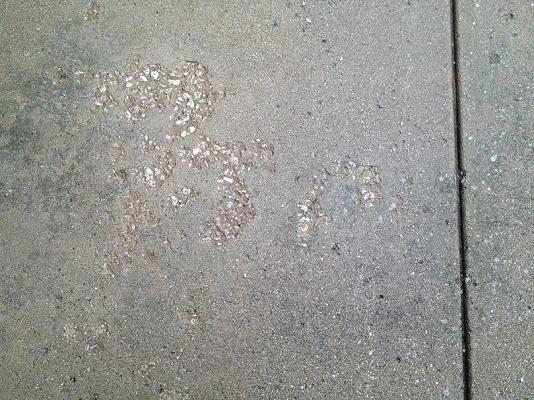
The freezing water inside the concrete creates so much upward pressure on the concrete, that the smooth, non-aggregate top of concrete can “pit” or spall. This damage can be in large sections or in scattered smaller spots. When the smooth finished texture of the concrete is gone, these damaged spots show the aggregate mixture of the concrete that is below.
All Concrete Is Not The Same
All concrete is not created equal. The types of concrete that are most susceptible to spalling damage is freshly poured concrete and low strength concrete. Newly poured concrete, which is still holding a high water content already, usually needs around 30 days to “harden off” before rock salts can be used.
Low strength concrete mixtures can also be at greater risk from spalling. Concrete mixes with a compressive strength of less than 3,500 pounds per square inch could also show more spalling damage than other concretes. Low strength concretes also have a higher porosity, allowing more of the damaging salt/water mix to enter the concrete.
What Ice Melter Should Be Used On Concrete?
The preferred ice melter for concrete surfaces in the Midwest is Calcium Chloride. Calcium Chloride pellets are a fast acting product that melts ice/snow, and resists re-freezing to a temperature of –25 degrees. This protection to lower temperatures reduces the frequency and damage potential of the freeze/thaw cycles.
Are Concrete “Brick” Pavers Affected?
No. To be considered a concrete or “brick” paver, the concrete used in the mix must have a compression strength of over 8,000 pounds per square inch. This high quality concrete therefore has a very low porosity and allows very little water into the concrete. This is another reason why concrete pavers are a better choice than concrete for sidewalks and driveways.
Other Types Of Ice Melters
In our area, there are four main types of ice melters that are commercially available. They are as follows:
Rock Salt (25 Degrees Protection)
Potasium Chloride (15 Degrees Protection)
Magnesium Chloride (-13 Degrees Protection)
Calcium Chloride (-25 Degrees Protection)
Many suppliers are now offering custom blends of these chemicals to reduce cost, however, these custom blends are less effective than the straight products.
What NOT To Use
The most damaging of all ice melters contain ammonium nitrate and/or ammonium sulfate. These chemicals attack concrete chemically and can cause great damage, therefore should never be used as ice melters. Please note that these chemicals are locally available and are actually still used by some landscape companies.
Commercial Snow Plowing
We are currently accepting commercial contracts for snow plowing & salting. Servicing Multi-Family Properties, HOA's, Condominiums, Townhomes, Apartment Buildings, and Shopping Malls in our service area. Space is limited, so get your free quote today.
Salting & Ice Control Service
Ice on sidewalks, driveways, or parking lots can be a dangerous liability to any type of property. Proper ice control will save your property far more than the cost of the service by avoiding just one slip and fall per season. How ice control works is salting & calcium chloride lower the freezing point of water from a temperature of 32 degrees fahrenheit to around 20 degrees, depending upon the salt solution ratio.
Since 1984, Suburban Landscaping has been providing reliable, professional snowplowing and salting services to commercial customers. Our goal is to provide our customers with safe, dry asphalt and concrete for their residents, customers, and vehicular traffic. We offer a myriad of services and plans to fit any situation, service level, and budget. With crews running 24/7 from November through March, our trained crews and managers are ready and responsive to every potential weather system.
Properties Serviced
Suburban Landscaping only services commercial and multi-family properties for snow and ice control. Below is a partial list of the property types we service.
- Condominiums
- Townhomes
- Apartments
- Businesses
- Hospitals
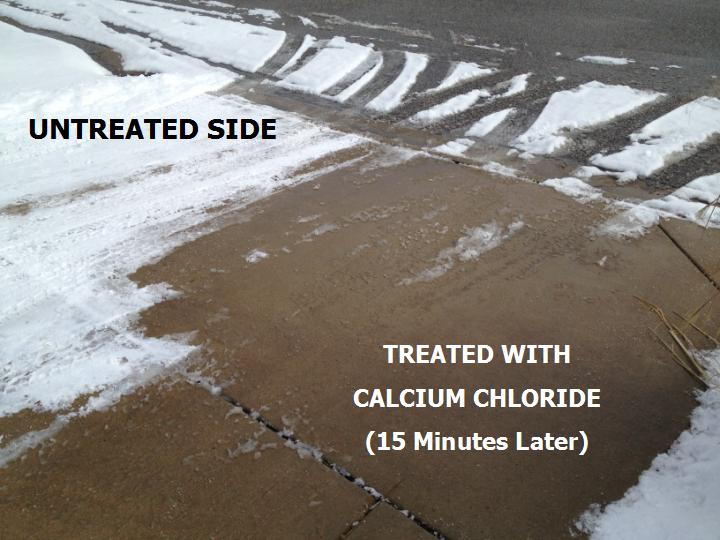
- Hotels
- Industrial Parks
Calcium Chloride
When concrete sidewalks need to be de-iced, we use calcium chloride to get the job done. While rock salt will damage concrete, calcium chloride is a safe and effective product that does not harm or flake concrete. Calcium chloride also has a lower working temperature than rock salt, making it the better choice when keeping concrete sidewalks clear of ice.
Rock Salt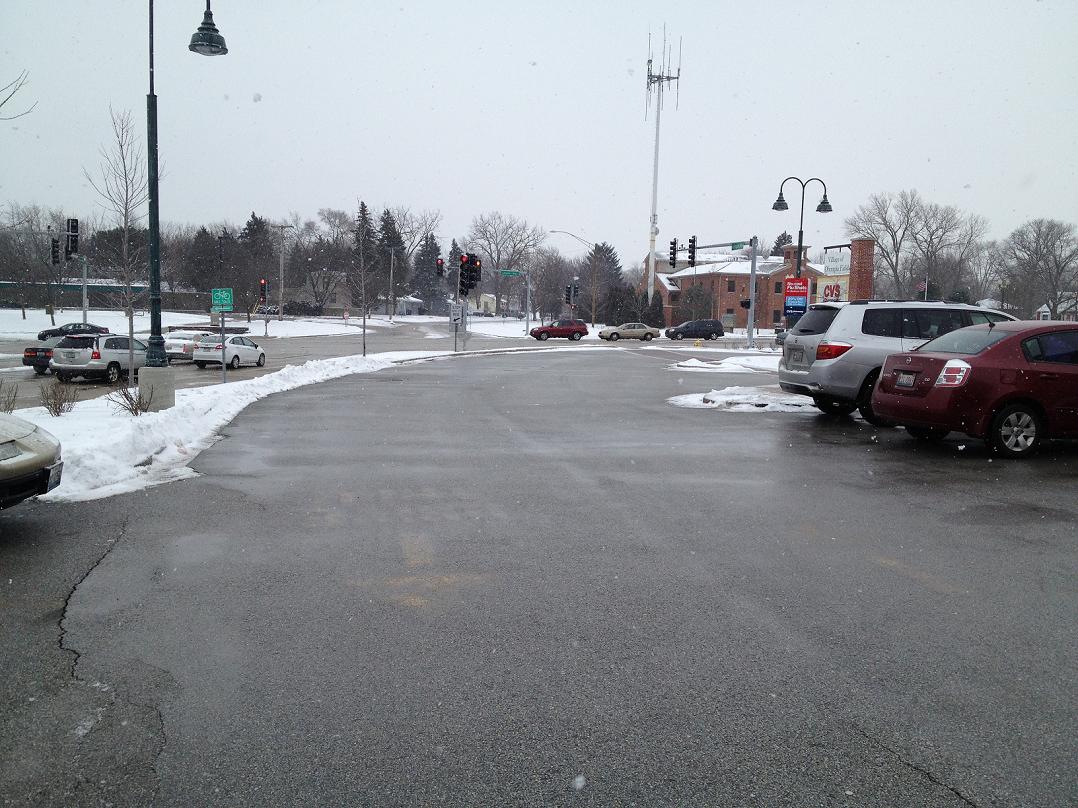
The industry standard ice melter for asphalt parking lots, driveways, and roadways, rock salt is the most cost effective way to maintain ice free pavement. With huge stock piles of rock salt at the ready, our salting teams run throughout the storm to keep your parking lots free and clear of dangerous icing situations.
Pre-Salting
If a zero-tolerance ice situation is called for by specs or insurance coverage, then pre-salting before possible icing events are a must. Our crews run 24/7 during the winter months and are ready and able to service your property even before the storm hits.
Service Plans
Automatic Service: Automatic salting is the best service plan for our clients who require ice free conditions. During an ice storm, snow storm, or after daytime rains when evening temperatures drop, salt trucks are dispatched to inspect all properties scheduled for "automatic salt". Salting is only preformed when ice accumulation is identified at the property, otherwise no salt is applied and no charge is billed. Clients who choose automatic salting are given first slot priority in salting routes.
Upon Request Service: If a property manager, Board, or property owner likes more control over salting and the salting budget, then upon request salting is the service plan for them. Upon request salting is just that, salting is only done upon the request of a pre-authorized individual for a particular property. Salt trucks are dispatched after the call comes in for the salting order.
What Does Ice Control Cost?
The cost for ice control varies each year by product and availability, especially for rock salt. Rock salt is used heavily by the City of Chicago and most municipalities, and they buy in huge quantities (1.4 million tons for Chicago alone) every year that supply can vary from year to year in our local markets. We offer rock salt in two different prices, by the ton and by the pound, depending upon the size of your property. Call for a free estimate on salting and ice control from one of our estimators for an exact price for the season.
Other Winter Services Available
In addition to snowplowing & ice control, Suburban Landscaping offers a wide range of additional winter services.
Snow removal

When snow piles become to large or a space is too small to pile additional snow, snow removal can be the answer. When parking spaces or access to functional areas such as garbage dumpsters or stairways become impeded by snow encroaching snow piles, the snow needs to be physically removed. With our fleet of removal equipment, Suburban Landscaping is ready to help.
Snow Relocation
Snow relocation is an essential service for some properties with limited space for snow storage from plowing operations. Snow relocation service will move piles of snow from high priority locations of your property to other, less used locations on your property. This service is a less time consuming and less costly way to manage your snow piles instead of snow removal.
Gypsum Applications
Salting is a necessary part of snow and ice control for most properties, however, it can be potentially problematic for lawn and plants. Rock salt can change the PH of the soil along drives and sidewalks that turf lives in. A gypsum application can significantly reduce the PH change in the soil in these areas, increasing the chance for the turf to survive.
Evergreen Wilt-proofing
During the winter, dry cold winds can sap the moisture out of the branches of evergreen trees and shrubs. Protecting the vital moisture of these plants can save evergreens from dead branches or even complete death in the spring. Installing a burlap wind barrier around your evergreens can significantly improve the health and well being of your evergreens.
Dormant Pruning
The winter season can be an excellent time to prune dormant trees. Reducing the stress of spring pruning and less costly with less clean up.
Winter Site Inspections
During the winter, commercial properties often accumulate debris that collects in the shrub beds and over the lawn area. Our winter site service offers to send a small crew to police the grounds, collecting debris of all kinds, including paper, fallen branches, trash, and any other objectionable debris.
Snow Fence Rental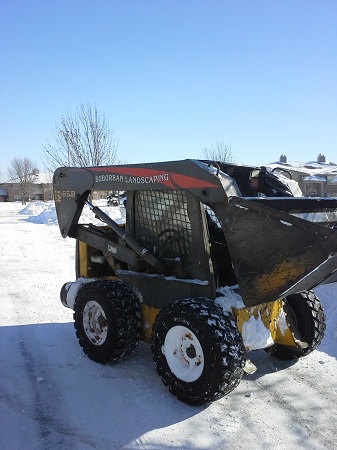
A snow fence can be a very useful tool in the seasonal battle against keeping roads, sidewalks, and entrances clear of drifting and blowing snow. Snow fences are a physical barrier that allows blowing wind to pass through, but blocks the snow that the wind gusts carry with them, thus creating a pile of snow in a desired area instead of on a street or sidewalk.
